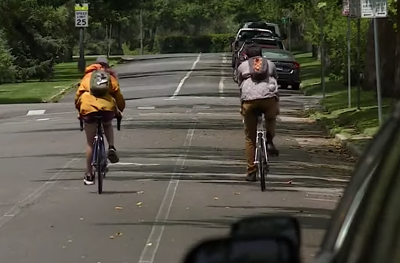The public policy debate is over. The money is being spent, elected leaders are making promises and, like it or not, bicycles and motor cars are as politically entwined in Colorado as asphalt and turn lanes.
How we evolve into this multimodal vision that some have is everything. If empty light rail cars zipping past traffic jams have taught us nothing, it's that showing up behind the trend is a losing proposition. The stagecoach gave way to the train, so traffic always finds a way to roll on.
During the 2018 election cycle, I was talking with my friend Scott Wasserman, the top dog at the economy-minded Bell Policy Center, about whether Democrat Jared Polis and his talk of bullet trains and gasless cars could win the governor's race over the hard, cold asphalt offered by Republican Walker Stapleton.
Scott told me Coloradans would decide with their votes whether they want to live, and travel, in the past, whether anybody thought we'd get around in the future the way we're getting around now. The answer, of course, was no.
As governor, Polis hasn't taken his foot off the pedal on aspirations, but his hard lean on electric vehicles could mean fewer dollars for roads from gas taxes. We're still waiting to see his long-range transportation plan.
This past week, Denver's ballyhooed B-cycle bike rental program, a trendy concept five minutes ago, announced the B stands for buh-bye. B-cycle says it couldn't make a go of it here, even with hundreds of thousands of dollars in city subsidies each year.
Dockless scooters are all the rage for at least the next 10 minutes. OK, Boomer?
To meet the clean-air goals set by the city's socially conscious leaders, Denver will keep trying, as the Department of Transportation and Infrastructure works up a contract for a new vendor.
Voters are bought in. Three years ago they set aside $18 million to install 125 miles of bike lanes and trails by 2023 as part of the $937 million Better Denver bond issue, which passed overwhelmingly.
Not everybody is happy about it, certainly not the drivers who can't find street parking anymore, but also not some of the residents annoyed by the disruption of their neighborhoods for the benefit of cyclists.
Allen E. Hill described the dismay at a Jan. 21 meeting among residents in the Winston Downs and South Hilltop neighborhoods, when they heard a city plan to put a bike lane along Virginia Avenue.
The bike lanes will wipe out the street parking, sending more parked cars into the side streets. Then there's the question of how cars will access Denver Green School and George Washington High, he wrote in a Denver Post letter to the editor on Sunday. "They too would be pushed into surrounding streets," Hill said.
Yield with caution, policymakers.
On Monday afternoon Sen. Mike Foote, a Democrat from Lafayette, presented a bill to apply the first set of laws specifically to bike lanes, Senate Bill 61.
His legislation is the first Colorado law specifically on bike lanes. Failing to yield to a bicycle in a bicycle lane would be a class A traffic offense, which would graduate to careless driving and a class 1 misdemeanor by causing an injury. A conviction could carry up to 18 months in jail and a $5,000 fine.
In the bigger picture, civil liability often is driven by criminal liability, which brings lawsuits and motives into the question.
Listening to the victims of auto-cyclist accidents appearing before the Senate Judiciary Committee Monday, you couldn't help but feel sympathy.
To hear the cycling advocates tell it, though, it’s the motorists to blame for the carnage, and that’s simply not true. Cyclists sail through stop lights at city intersections, because it's dangerous for them to stop and start with cars and trucks, we're told. Some crowd the edge of their assigned bike lanes, others glide on and off Denver’s sidewalks like they're hanging 10.
Anyone who has seen that happen with impunity doesn't feel inclined to hear a lecture about safety from the cycling community. A lot of good could come out of government cracking down on cyclists just as hard as the law cracks down on drivers.
The hard reality is that as we build more bike lanes and put more people on bikes on the road, we put more people in harm's way. Bicycle fatalities have risen 31% nationally in the last five years, AAA Colorado spokesman Skyler McKinley told the Senate committee.
"That is a public health emergency," he said. "In America, on average, a car will kill a bicyclist or pedestrian every hour and a half, so there is a clear and very dangerous conflict between bicycles and automobiles."
Of the 67 traffic deaths in Denver between January and November 2019, three were cyclists and 20 were pedestrians, according to police stats.
We're told to share the roads, but we first have to share the problem. A blame game on a long guilt trip permeates this discussion, with plenty of virtue signaling about how people get around.
Tone is the unspoken poison of compromise.
A more socialist approach toward public safety might do better here, because we all share the burden of safe streets.







(0) comments
Welcome to the discussion.
Log In
Keep it Clean. Please avoid obscene, vulgar, lewd, racist or sexually-oriented language.
PLEASE TURN OFF YOUR CAPS LOCK.
Don't Threaten. Threats of harming another person will not be tolerated.
Be Truthful. Don't knowingly lie about anyone or anything.
Be Nice. No racism, sexism or any sort of -ism that is degrading to another person.
Be Proactive. Use the 'Report' link on each comment to let us know of abusive posts.
Share with Us. We'd love to hear eyewitness accounts, the history behind an article.